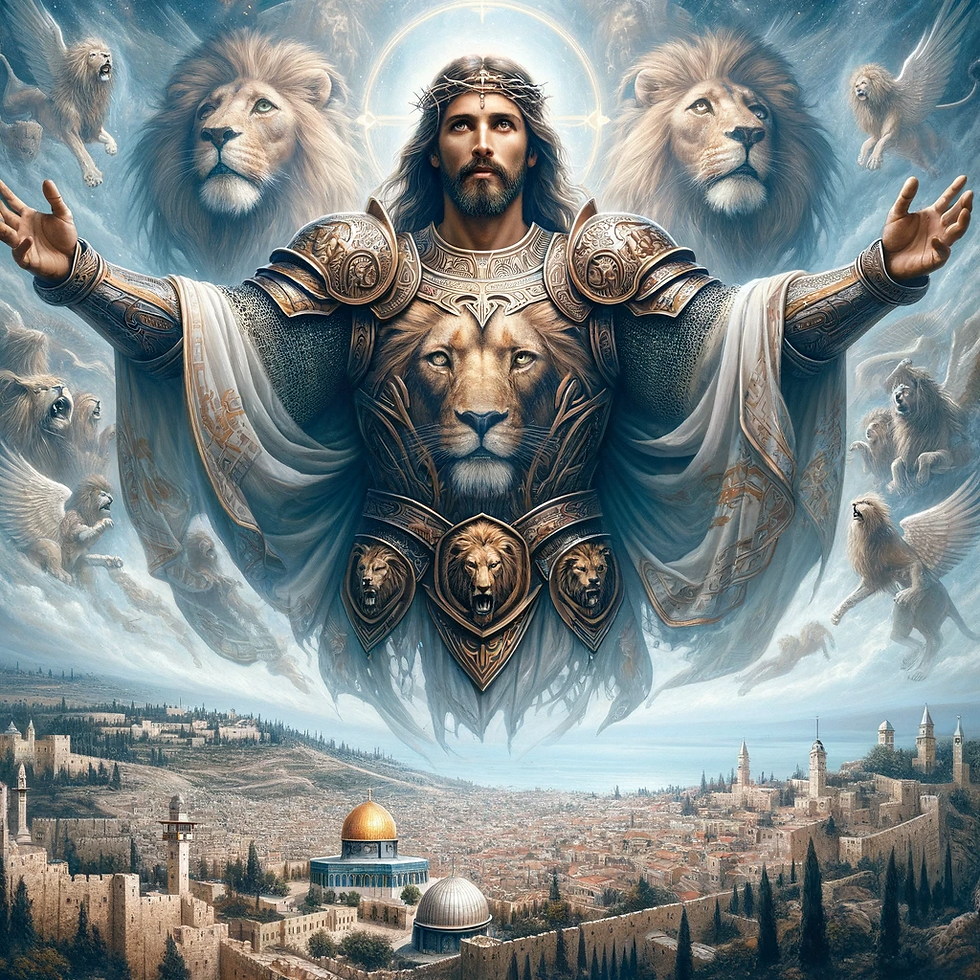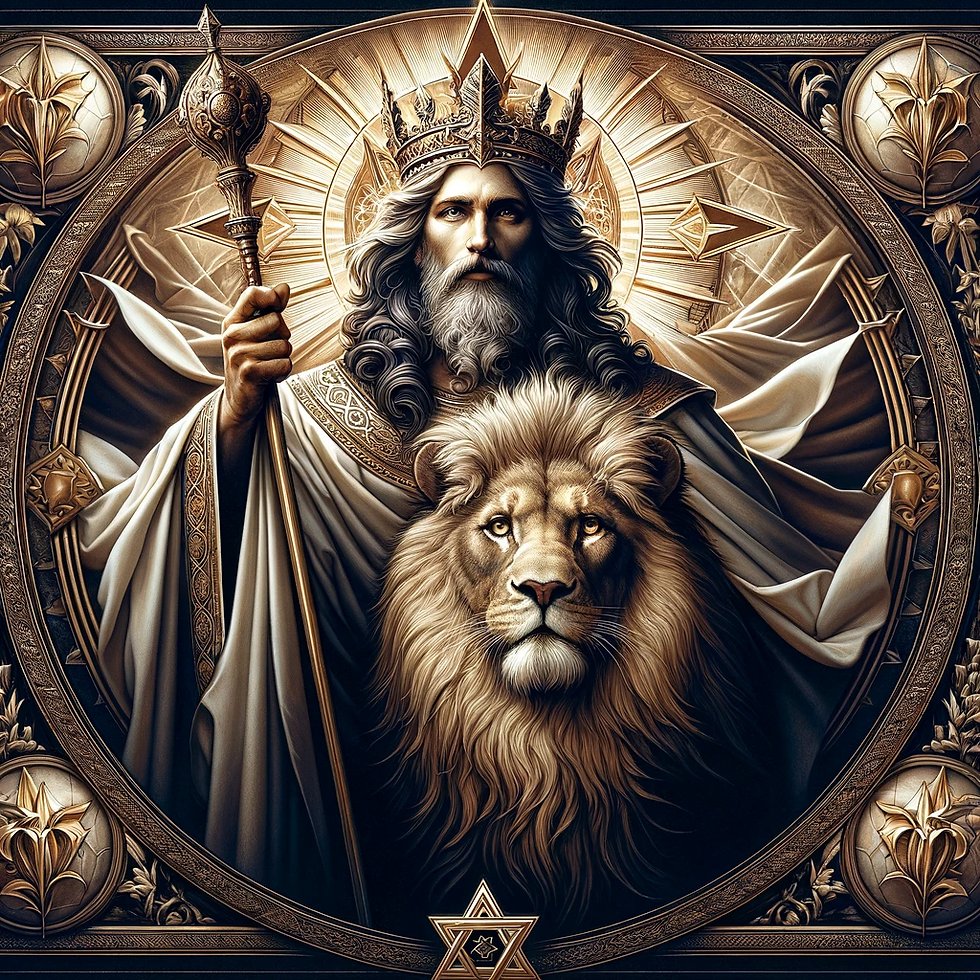Exploring the Belief that Jesus Cant Return Until the Jewish People Proclaim Him as the Messiah
- quantuminfinitycon
- Nov 11, 2023
- 5 min read
The Role of Jewish People in the Second Coming

Introduction
The belief that Jesus will return when the Jewish people acknowledge Him as the Messiah is a concept steeped in Christian eschatology and biblical interpretation. This idea is not uniform across all Christian denominations, with some placing emphasis on this belief, while others interpret biblical prophecies differently.
Throughout history, Christians have eagerly anticipated the second coming of Jesus Christ. The idea that Jesus' return is contingent upon the Jewish people proclaiming Him as the Messiah is rooted in biblical passages that speak of the restoration of Israel and the salvation of the Jewish people. This belief has fostered discussions and debates among theologians and scholars, exploring the relationship between Christianity and Judaism, as well as the interpretation of biblical prophecies.
The Concept of Messiah in Christian Theology
In Christian theology, Jesus of Nazareth is widely believed to be the Christ or Messiah. The terms "Christ" and "Messiah" have their origins in Greek and Aramaic/Hebrew respectively, both signifying "anointed one." The concept of the Messiah is deeply rooted in the Old Testament, where prophecies foretold the coming of a chosen one who would bring salvation and establish God's kingdom on earth.
Interestingly, Jesus preferred to refer to Himself as the "son of man" rather than using the title of Messiah. This deliberate choice may have been to challenge preconceived notions and expectations about the Messiah, emphasizing His role as a suffering servant rather than a political or military leader. Jesus' understanding of the Messiah challenged contemporary expectations, emphasizing love and sacrifice over power and domination.
Jesus' Redefinition of Messiah
Jesus redefined the concept of Messiah during His time, teaching that His kingdom would not be defined by political boundaries but would embrace people from every nation. The title of Messiah is strongly linked to the concept of kingship, and Jesus was associated with the Davidic dynasty. His identification as the "son of God" is connected to His role as the anointed king.
By redefining the concept of Messiah, Jesus emphasized the spiritual nature of His kingdom and the importance of faith and repentance. He challenged the traditional understanding of the Messiah as a political deliverer, urging His followers to focus on the transformation of the heart and the establishment of God's reign within individuals.
The Proclamation of Jesus as Messiah
It was only after His death, resurrection, and ascension that Jesus' followers publicly proclaimed Him as the Messiah. During His lifetime, He avoided using the title of Messiah due to the misleading connotations it had in His time. Jesus' understanding of the Messiah challenged contemporary expectations, emphasizing love and sacrifice over military power.
The proclamation of Jesus as the Messiah by His followers marked a significant turning point in the early Christian community. It solidified their belief in His divinity and the fulfillment of Old Testament prophecies. The apostles and early disciples boldly proclaimed Jesus as the long-awaited Messiah, spreading the message of salvation and redemption to both Jews and Gentiles.
The Role of Jewish People in the Second Coming
The belief that Jesus will return when the Jewish people acknowledge Him as the Messiah is based on interpretations of biblical prophecies. Opinions on this belief vary widely among Christian denominations. The Book of Revelation is often referenced in discussions about the return of Christ and end times events.
According to some interpretations of Scripture, the return of Jesus is closely connected to the restoration of Israel and the conversion of the Jewish people. This belief stems from passages such as Romans 11:25-27, which speaks of a future time when "all Israel will be saved". Proponents of this view argue that Jesus' return is contingent upon the Jewish people recognizing Him as their long-awaited Messiah.
However, it is important to note that not all Christians hold this belief. Interpretations of biblical prophecy vary, and some theologians argue that Jesus' return is not dependent on the actions of any specific group, including the Jewish people. They emphasize that the timing and manner of Jesus' return are known only to God and that it is not contingent upon human actions or beliefs.
Biblical Prophecies and the End Times
The return of Jesus is believed to be preceded by specific signs or events mentioned in the Bible. These prophecies are interpreted differently by various Christian denominations, especially in relation to the Jewish people proclaiming Jesus as the Messiah. The belief in Jesus' return is closely tied to the concept of end times and the fulfillment of biblical prophecy.
One example of a biblical prophecy often associated with the second coming of Jesus is found in Matthew 24:30, which states, "Then will appear the sign of the Son of Man in heaven. And then all the peoples of the earth will mourn when they see the Son of Man coming on the clouds of heaven, with power and great glory". This passage and others like it are seen as indicators of the imminent return of Jesus and the establishment of His kingdom on earth.
However, the interpretation of these prophecies can vary significantly. Some Christians believe that the Jewish people playing a specific role in the second coming is a necessary condition for Jesus' return. Others believe that the fulfillment of biblical prophecies is a complex and multifaceted process that cannot be reduced to a single event or condition.
The Messiah and Jewish Traditions
The concept of the Messiah holds significant importance within Jewish traditions. Jewish perspectives on the Messiah vary both historically and currently. It's worth noting the potential implications for Jewish traditions and beliefs if they were to proclaim Jesus as the Messiah.
In Judaism, the Messiah is seen as a future figure who will bring peace, justice, and the ultimate redemption of the world. The Messiah is expected to fulfill specific prophecies outlined in the Hebrew Scriptures and usher in a period of universal harmony and righteousness.
For many Jewish individuals and communities, the idea of proclaiming Jesus as the Messiah would contradict their understanding of the Messiah's role and the teachings of Judaism. The relationship between Christianity and Judaism has often been complex and fraught with tensions throughout history. Any discussion of the Jewish people proclaiming Jesus as the Messiah must take into account the diverse perspectives within the Jewish community and the potential impact on Jewish traditions and beliefs.
Conclusion
The belief that Jesus will return when the Jewish people acknowledge Him as the Messiah is a complex subject, deeply rooted in Christian eschatology, biblical interpretation, and interfaith dialogue. It's essential to consider the varying interpretations among different Christian denominations and the implications for Jewish traditions.
While some Christians believe that the Jewish people playing a specific role in Jesus' return is a necessary condition, others interpret biblical prophecies differently. The relationship between Christianity and Judaism is multifaceted, and any discussion surrounding the Jewish people proclaiming Jesus as the Messiah should be approached with sensitivity and respect.
Further reading on this topic includes works by Michael F. Bird, Joshua W. Jipp, and N.T. Wright. Exploring different perspectives and engaging in respectful dialogue can deepen our understanding of this complex theological topic and foster greater mutual understanding and respect between Christians and Jews. Please visit our Affiliate Sponsor PREDRAFT.AI OR Please Help Fund My Global Reality by Clicking Here, anything helps. Thank you for YOUR Support, you are appreciated and loved! NOTICE: Content created by Steven W. Scott with the assistance of AI products, the written creativity of the Article is that of the content creator, AI assisted in outlines, formatting, grammar, spelling and graphic video. Edited, approved and Copyrighted by My Global Reality Staff Editor, DBA QIC (Quantum Infinity Consulting).





Comments